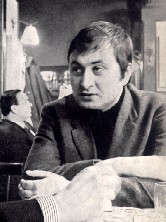Konrad Bayer [Austria]
1932-1964 "you don't have to listen, goldenberg said, and you will understand everything much the better"
—Konrad Bayer, der sechste sinn  The group around Artmann (later the so called Vienna Group) crystallized itself with (besides Artmann) Konrad Bayer, Gerhard Rühm, Oswald Wiener and Friedrich Achleitner as the main members. The experience of collective community was great, not to say overwhelming: they arranged scandals in the streets and in sinister hovels, they put up plays and wrote texts together, they kept company so intensely and with such qualitative demands upon ther being together, that their individual lives many a time were dissolved into that of the group itself. They formulated a practical critique of the artist as one of many specialists in the separated and separating capitalistic society (on individual experiences and their expressions, namely). This was done with a brutal frankness that in this decade only compares with the activities of that lettristic group in France where Guy Debord played the role of Artmann.
The group around Artmann (later the so called Vienna Group) crystallized itself with (besides Artmann) Konrad Bayer, Gerhard Rühm, Oswald Wiener and Friedrich Achleitner as the main members. The experience of collective community was great, not to say overwhelming: they arranged scandals in the streets and in sinister hovels, they put up plays and wrote texts together, they kept company so intensely and with such qualitative demands upon ther being together, that their individual lives many a time were dissolved into that of the group itself. They formulated a practical critique of the artist as one of many specialists in the separated and separating capitalistic society (on individual experiences and their expressions, namely). This was done with a brutal frankness that in this decade only compares with the activities of that lettristic group in France where Guy Debord played the role of Artmann. Unlike the Frenchmen who developed into the Situationist International, the ViennaGroup was never capable of bursting the artistic limits. Their invocations turned into ricochetting bullets; Artmann became quite famous (as a crazy bastard) and the others more or less tired of always having to be thrown upon their own resources. The group was dissolved in the early sixties.
The most consequent member of the Vienna Group was Konrad Bayer (1932-1964). It is no coincidence that his own literary production begins where the Vienna Group ends. It is inconceivable without precisely this direct and double experience of isolation and community; of the possibilities of communication and their inexorable dissolvment. Significantly enough, Bayer’s first book (starker tabak - "Strong Tobacco" - 1962) was written together with Oswald Wiener, but already before that he had distinguished himself as the most uncompromising member of the group, especially with his plays that spit on conventional theatre as well as on its actors and audience.
In 1963 he published Der Stein der Weisen(The Philosopher's Stone), a collection of dry, lyrical texts which he explicitly regarded as a basic tract. Here he establishes a view of life that runs through all his works and superficially may be called pessimistic: human beings are living their lives isolated from each other, get in touch only temporarily and have nothing more than their language in common. Not surprising some academic dunces have reproached Bayer's texts for cruelty and lovelessness (Mr Professor, Konrad is nasty!), when they are nothing but elementary probings of our conditions of living, descriptions of our relations to the categories of existence in this society. To prove my point here is a short text from "der stein der weisen":
everything may be called this or that.
everything also wants to be called something else.
the apple between my teeth is a taste.
a stone in the skull causes a lump.
the woman before your eyes is so far a sight.
As a whole Bayer's texts are negating. They repeat again and again that it shouldn't be possible to live in this way. They describe and curse this boredom and void that have burned their brand marks deep into the flesh and soul of modern man.
His two posthumous "novels", Der Kopf des Vitus Berings ("Vitus Bering's head", 1965) and der sechste sinn ("the sixth sense", 1966) are both about our endeavours at tear to pieces this tight and transparent web that separates us all. Sometimes his words and sentences may seem disharmonious, but this is not mainly a matter of literary technique, linguistical experiments. It is the situation of mankind mirrored by language.
Bayer also wrote plays and acted in the films, Sonne halt! (Sun Stop!), Konrad Bayer, order: die welt bin ich und das ist meine sache (Konrad Bayer, or: the world I am and that’s my business), and Der Kopf des Vitus Bering (Vitus Bering’s Head).
Bayer himself, his body, his will and his consciousness, voluntarily took a leap away from all this in October 1964. The air being so bad to breathe, he fed his lungs with gas.
—Ingemar Johansson
BOOKS OF POETRY
Starker tabak (with Oswald Wiener) (1962); DerStein der Weisen (Berlin: Fietkau, 1963); Das Gesammelte Texte (Reinbek bei Hamburg: Rowohlt, 1966); Gesamtwerk (Reinbek bei Hamburg: Rowohlt, 1977); Sämtliche Werke (Stuttgart: Klett-Cotta, 1985)
ENGLISH LANGUAGE TRANSLATIONS
Selections from Der Kopf des Vitus Bering in The Vienna Group: 6 Major Austrian Poets, trans. by Rosmarie Waldrop and Harriett Watts (Barrytown, New York: Station Hill Press, 1985); Selected works of Konrad Bayer (London : Atlas, 1986)